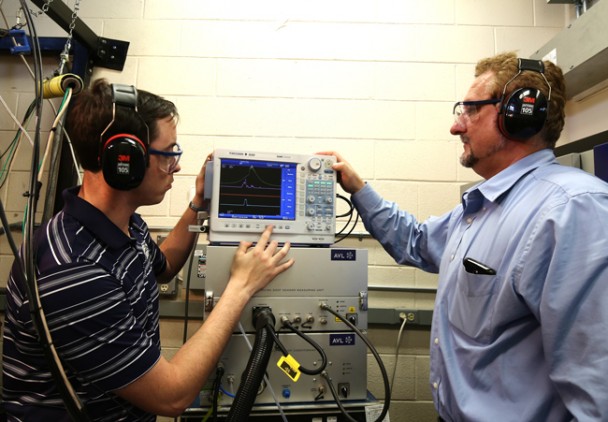Georgia Southern graduate student wins fellowship to study renewable energy

Martin Muinos (left) works with Val Soloiu, Ph.D., on a high speed data acquisition system able to detect minute amounts of soot in engine exhaust — part of Muinos’ Reactivity Controlled Compression Ignition research project for the National Science Foundation.
He’s published four peer-reviewed papers, three of which were presented at the Society of Automotive Engineers (SAE) World Congress. He’s done research which hasn’t been tried anywhere else in the world and he won two different research grants to do them. He’s part of a laboratory attempting to steer the automotive industry closer to renewable energy sources.
And he did it all as an undergraduate student at Georgia Southern University.
Martin Muinos is currently finishing his first semester in the Master of Science in Applied Engineering program with a concentration in Energy Science. Even though he’s only begun his graduate studies, for the last two-and-a-half years he’s been a researcher in Georgia Southern’sRenewable Energy and Engines Laboratory (REEL), the most advanced of its kind in the Southeast, and the only one of its kind in the nation with undergraduate researchers. He says he can’t imagine getting to do the work he’s done anywhere else.
“If we were to visit a research facility conducting similar research anywhere in the United States, we would be surrounded by post-docs, Ph.D.’s, and grad students,” said Muinos. “In the Engine Combustion and Emissions lab at Georgia Southern, I am one of three graduate students working under the supervision of one professor and working alongside 15-20 undergraduate students.”
At the laboratory, Muinos has been conducting experiments in Low Temperature Combustion through Reactivity Controlled Compression Ignition (RCCI) with renewable fuels such as biodiesel, and butanol: fuels made from biomass. The process of combining RCCI with these fuels delays combustion in the fuel-efficient diesel engine, which reduces its soot and smoke emissions and cleans up its dirty reputation.
“We’re currently working on another paper, testing RCCI with synthetic kerosene, and that’s never been attempted with the fuels that we’re testing,” said Muinos. “Every couple of months I’m in the test cell, running the engine, thinking, ‘Wow, nobody’s ever done this before.’ It’s really novel fuels that we work with. It’s a great opportunity.”
Muinos’ research recently led to his selection as a National Science Foundation (NSF) Graduate Research Fellowship recipient. He was one of 2,000 graduate students in the nation to receive the $136,000 fellowship out of 16,500 applicants. He joined recipients from such institutions as Georgia Tech, MIT, Stanford, Princeton and Cornell.
The award will allow him to focus all of his attention and efforts on his research and thesis, and continue to learn under his mentor, Valentin Soloiu, Ph.D., the Allen E. Paulson Distinguished Chair of Renewable Energy, an influence Muinos says goes far beyond the classroom.
“A couple of weeks ago, we were at the SAE World Congress in Detroit, and it’s amazing how many people know Dr. Soloiu up there,” he said. “I think we talked to three or four presidents of different companies or vice-presidents of different companies that he knows personally and they appreciate him. Previous master’s students have gotten jobs in Detroit just from being in this lab. One research company — I think they currently have five of his former students now.”
Soloiu said the awards and accolades weren’t just the result of his mentorship, however. Muinos entered the University as a transfer from Southern Polytechnic State University as a sophomore, and within just six months of being introduced to the lab, he was promoted to a full student researcher — “one of the fastest student promotions in years,” Soloiu said.
Muinos says the professor’s influence has been invaluable, and is a testament to Georgia Southern’s reputation as a “large scale, small feel” research University.
“I can go talk to any of my professors at any time,” said Muinos. “They’re always available — especially Dr. Soloiu. If I have a question, I just email him and he’ll email me right back. I’ll go to his office or labs and he’s there for me.”
In the future, Muinos hopes to continue his work in engineering, eventually pursuing a Ph.D. and working in a national lab. Dr. Soloiu said the student has already received an offer from the Argonne National Laboratory in Chicago, which houses some of the brightest minds in the world and boasts $760 million in funding. Muinos politely declined.
The fellowship gives him more time — time with his research and time to continue learning under his mentor.
“It’s not every day I’m told I can get paid to be a student,” he said.
Posted in Archive, news, Research, Uncategorized